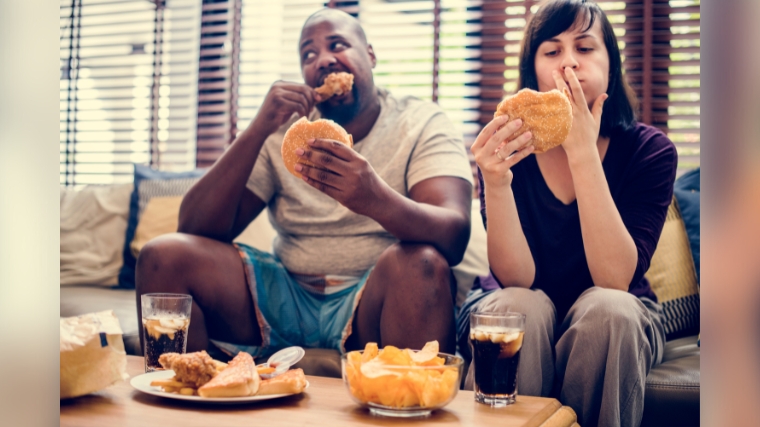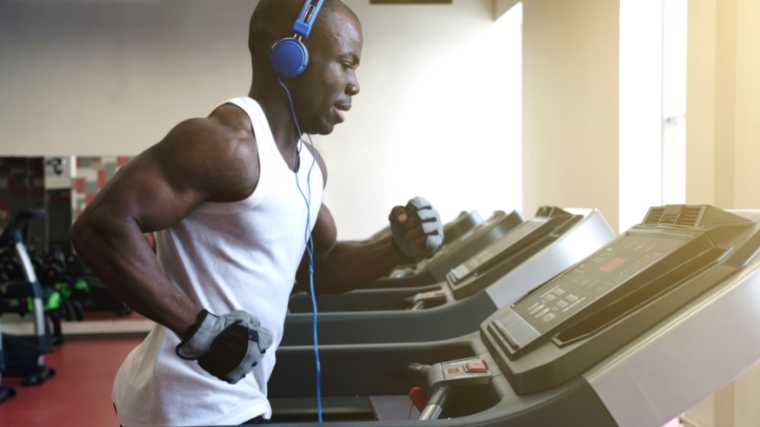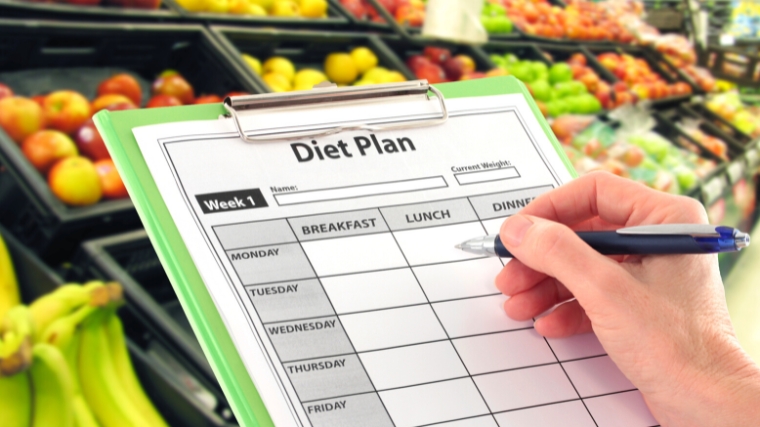Even the most diligent strength athlete might struggle to do what it takes in the kitchen to maintain particular gains in the gym. It might feel like no problem to commit to four to five high-intensity workouts each week. But you encounter food a lot more often than you encounter free weights. For many athletes, this makes a nutrition plan a lot harder to stick with.
If you’re looking to lose some weight by restricting your calorie intake, one of the most important factors is sustainability. Your body and your mind both must stick to your weight loss plan over the long haul. Giving yourself short-term breaks from calorie restriction with refeed days may help you get closer to your long-term goals.

Here, you’ll find out what a refeed day is, how it’s different than a cheat day or cheat meal, and how to incorporate refeed days into your nutritional program.
- What Are Refeed Days?
- Refeed Days Vs. Cheat Meals
- Benefits of Refeed Days
- Potential Drawbacks of Refeed Days
- Who Needs Refeed Days?
- Who Doesn’t Need Refeed Days?
- How Many Refeed Days Per Week?
What Are Refeed Days?
A refeed day is a day during a weight loss phase where you aim to eat slightly above your maintenance level of calories, generally getting those extra calories through carbohydrates.
If one of your fitness goals is to lose body fat, chances are you’re trying to eat at a caloric deficit — where you’re eating slightly fewer calories than you need each day based on your activity level and other factors. Refeed days give you a break from restricting calories, prompting you to eat slightly above maintenance calories instead of slightly less.
For athletes that find calorie counting helpful, you can use BarBend’s calorie intake calculator to help you determine your maintenance needs, your day-to-day weight loss needs, and your refeed day surplus needs. Here’s the calculator:
Calorie Calculator
Even if your goal is weight loss, not all athletes are willing or able to count calories due to factors as wide-ranging as personal preference and recovery from a history of disordered eating. If counting calories isn’t for you, you may opt for a more intuitive approach to eating.
This intuitive eating approach may feature paying attention to your own hunger cues. You might also estimate portions to ensure that you’re getting enough macronutrients and micronutrients to meet your goals and needs.
In this case, you can approach refeed days as a day when you have an additional portion or two of carbs.
To help you figure out how your macronutrient ratios — the relationship between protein, carbs, and fats — fit in with your goals, you can check out BarBend’s macronutrient calculator here.
Macronutrient Calculator
As with the calorie intake calculator, your own goals and activity levels impact your ideal intake levels. If you don’t want to look at specific numbers day-to-day, you don’t have to. You can use an estimate of your portions to keep your ratios roughly the same.
Refeed Days vs. Cheat Meals
With a cheat meal, you’re going to town and having pretty much all the food your heart’s been desiring throughout the rest of the week. You kick back and stop paying attention to calorie counts and macro proportions and instead go for the gains of taste.
While there’s a lot to be said for (and against) a solid cheat meal — or full day of “cheat” — refeed days are not cheat days. The idea behind refeed days is similar to cheat days — giving your body and mind a much-needed break from the rigors and potential risks of caloric restriction. But they’re not approached in the same way.
Here are some of the key ways that refeed days and cheat meals or days are different:
- Refeed days still involve paying attention to calories — or at least macro tracking — aiming to only eat a little more than your typical amount during a weight loss phase. Cheat days and meals typically have a more “anything goes” approach.
- Cheat meals usually involve pretty much whatever you want. And while you can structure a refeed day as you wish, these are typically thought of as focusing on carbs rather than more protein or fat.
- Refeed days are more measured than cheat days. Instead of eating slightly under your maintenance calorie intake, you’ll eat slightly above it on a refeed day. Typically, you’ll get those extra calories through carbohydrates.
Different athletes prefer different strategies for nutrition. If one of these strategies strikes you as more sustainable than another, it might be worth paying attention to your gut. Nutritional plans that feel psychologically sustainable for athletes are often more likely to help achieve long-term physique goals. (1)(2)(3)
Benefits of Refeed Days
Okay, fine. Refeed days are different than cheat meals. But are they any more effective than cheat meals at helping someone along their weight loss journeys? Read on to get a glimpse into the potential benefits of adding refeed days to your nutritional plan.
More Sustainable Weight Loss
Refeed days might make periods of caloric restriction easier psychologically and emotionally. If you’re restricting your dietary intake tonight and tomorrow, you can look forward to loosening the reigns at your friend’s brunch outing on Saturday. This flexibility can make a nutrition plan built around weight loss more emotionally sustainable.
The less rigid your nutrition plan, the more likely you are to be able to sustain the habit. Refeed days help break up the potential monotony of only eating certain foods and coming in under a certain caloric intake each day.
Fewer Negative Effects
Caloric restriction can come with some unpleasant side effects. When you’re in a caloric deficit, you may experience anything from changing hormone levels and hunger to lethargy and exhaustion, while also plateauing in your weight loss goals. (4)(5)
Because refeed days give you an extra burst of calories — specifically from carbohydrates — your body gets a break from the negative impacts of caloric restriction. Giving your body a day or two each week of reprieve from the demands of weight loss can make a world of difference.
Think of it almost as an active recovery day on the nutrition side. You don’t necessarily want to lie in bed all day and do nothing (analogously, have a “cheat” day where you binge eat). Instead, on an active recovery day, you’ll do some light physical activity like jogging, swimming, or yoga.
Similarly, with a refeed day, you’ll do some light “cheating” where you strategically eat a little bit over your maintenance level. Like physical recovery, this protocol allows your body time to maintain the gains you’re accomplishing during the rest of the week. At time same time, you’re giving your body a break from the demands of your usual schedule.
Potentially Reduced Binge Eating
Eating less food isn’t an automatic recipe for losing weight. Research shows that the more severely you restrict your food intake, the more likely you are to binge eat. (6)(7)(8)
Overall, studies suggest that slower, more gradual approaches to weight loss allow athletes to maintain muscle mass and sustain weight loss results. (9)(10)(2)(3) Flexible approaches can be just as effective at helping athletes lose body fat when compared to rigid programs, especially in the long term. (1)(2)(3)
But flexible approaches have been shown to be more sustainable physically and psychologically. (2)(3) Refeed days can provide the flexibility you need to sustain long-term weight loss and avoid the short-term binge eating that often accompanies rigid fat loss phases.
Potential Drawbacks of Refeed Days
Just because refeed days can be good for some people doesn’t mean they’re going to be good for everyone. Here’s a list of some of the reasons you might choose to avoid refeed days.
More Rigid Thinking
While refeed days are less rigid than restricting calories 100 percent of the time, they’re still more rigid than completely intuitive approaches to eating. Some athletes recovering from disordered eating habits or who are looking to break away from a particular approach to food may want to avoid thinking about calorie counts and tracking macros altogether.
In that case, refeed days might not be for you. This approach still requires an awareness of your calorie intake and macro tracking. While you can opt to approach refeed days with a ballpark estimate or a focus on macros instead of precise calorie numbers, refeed days are distinguished from “cheat” days by their slightly stricter approach.
Instead, someone who wants to avoid this kind of rigidity altogether might forego refeed days in favor of an intuitive approach to eating that is more flexible every day.
Used Overenthuasiastically
Enthusiasm is generally an excellent quality in the world of strength sports. But when it comes to refeed days, you might be able to have too much of a good thing.
Refeed days are part of a strategy that does involve paying attention to your deficit and maintenance level of calories. With a cheat meal or day, it’s part of your nutritional plan to go all out and really not pay attention to counting either calories or macros. That’s completely fine if that’s part of your game plan.
But that’s not really what a refeed day is all about. You will still be paying attention to your calorie count and macro split. On refeed days, you’ll consume slightly higher than maintenance amounts of calories, with the surplus largely from carbs. This is in contrast to eating slightly lower than maintenance amounts of calories.
However, if you go overboard and treat a refeed day like a cheat day, it’ll still be… well, a cheat day. And while there’s not necessarily anything wrong with that, using a refeed day overenthusiastically and completely losing track of your counts may cause your progress to stall.
Won’t Curb Appetite the Next Day
While your goals might be sound, some athletes may decide to deploy refeed days for the wrong reasons.
If you want to use refeed days to “trick” your body into eating less the next day, you’ll likely run into disappointment. Athletes might reason that eating a lot on Monday may satisfy your body so much that it’ll want to eat less the next day. But research suggests that even increasing caloric intake by 50 percent over maintenance levels doesn’t automatically decrease hunger cues the next day. (11)
So if you’re trying to con your body into not wanting that much tomorrow by eating more today, a refeed is likely to disappoint.
A better way to spend your energy might be to tune into your body’s hunger cues to figure out which foods keep you fuller for longer. This may help you derive more emotional and physical satisfaction from your nutritional plan when you’re trying to lose weight.
Who Needs Refeed Days?
When strength athletes are looking to lose weight, it’s often easy to start thinking about food in black-and-white terms. But refeed days encourage a bit more flexibility than that. Throughout your week, at least one or two days will bring you out of your caloric deficit.
Refeed days may therefore be a good fit for strength athletes who want to lose weight while maintaining flexibility in their day-to-day planning.
However, these relatively flexible days are more measured than cheat days. As a result, competitive strength athletes like bodybuilders, powerlifters, and weightlifters may appreciate refeed days. This strategy can still account for overall calorie counting and macro tracking, so competitive lifters may favor this method over cheat days.
Who Doesn’t Need Refeed Days?
This strategy is targeted at athletes who are looking to lose weight. If you’re not currently in a phase where you’re typically at a caloric deficit — i.e., if you’re not looking to lose weight — you don’t need a refeed day.
Athletes who are already eating at or above their maintenance levels are likely aiming to maintain or gain weight. In that case, they won’t need a refeed day since their baseline nutritional plan doesn’t involve operating at a caloric deficit.
While some athletes may benefit from the relative flexibility of refeed days, others may find refeed days too rigid for their own needs. As such, refeed days might not be suited for athletes who need or want to avoid looking at calorie counts or macro tracking altogether.
How Many Refeed Days Per Week?
If your goal is to lose weight, you’ve got to be in a slight caloric deficit. Especially if you’re a strength athlete, you’ll generally want to continue eating enough to maintain or even build muscle. Still, if calorie counting is your method of choice, your daily emphasis will be on eating fewer calories.
While fluctuations day-to-day are normal and expected, the overall trend should be toward a diminished weekly net caloric intake when the goal is weight loss. You want to do refeed days enough to reap the benefits of flexibility. However, you don’t want to do them so much that your caloric intake on other days gets mathematically canceled out.
To strike that balance, try adding one or two refeed days per week to your nutrition plan. You can scaffold these to be centered around days of especially high-intensity lifting in the gym to help make sure you have the energy you need to crush the workouts and recover adequately.
If you’ve never done a refeed day before, start by adding one per week to your routine and see how it impacts your energy levels and weight loss goals over the course of a month or two. Assuming it goes well, consider adding a second refeed day to your week.
Continue to check in with yourself about your energy levels, strength and muscle growth, and weight loss goals to ensure that you’re staying on track.
Feed and Refeed
When you’re on a weight loss journey, keeping a sense of perspective can be extremely difficult. No, one meal is not going to make or break your goals in the long run — but yes, day-to-day attention to detail can make a big difference.
Refeed days are a deliberate strategy that will keep close attention on your maintenance caloric intake and macro split while also providing more freedom and flexibility in your nutritional plan. If you’re not able to pay close attention to your calorie counts, keeping track of your macros — and emphasizing those carbs — is another way to do your refeed. Let the gains begin.
References
- Conlin LA, Aguilar DT, Rogers GE, Campbell BI. Flexible vs. rigid dieting in resistance-trained individuals seeking to optimize their physiques: A randomized controlled trial. J Int Soc Sports Nutr. 2021 Jun 29;18(1):52.
- Ogden, J. (2010). The psychology of eating: From healthy to disordered behavior, 2nd ed. In The psychology of eating: From healthy to disordered behavior, 2nd ed. (pp. xii, 378–xii, 378). Wiley-Blackwell.
- Lowe MR. Dieting: proxy or cause of future weight gain? Obes Rev. 2015 Feb;16 Suppl 1:19-24.
- Peos JJ, Norton LE, Helms ER, Galpin AJ, Fournier P. Intermittent Dieting: Theoretical Considerations for the Athlete. Sports (Basel). 2019 Jan 16;7(1):22.
- Trexler ET, Smith-Ryan AE, Norton LE. Metabolic adaptation to weight loss: implications for the athlete. J Int Soc Sports Nutr. 2014 Feb 27;11(1):7.
- Hill JO, Wyatt HR, Peters JC. Energy balance and obesity. Circulation. 2012 Jul 3;126(1):126-32.
- Helms ER, Prnjak K, Linardon J. Towards a Sustainable Nutrition Paradigm in Physique Sport: A Narrative Review. Sports (Basel). 2019 Jul 16;7(7):172.
- Akkermann K, Hiio K, Villa I, Harro J. Food restriction leads to binge eating dependent upon the effect of the brain-derived neurotrophic factor Val66Met polymorphism. Psychiatry Res. 2011 Jan 30;185(1-2):39-43.
- Roberts BM, Helms ER, Trexler ET, Fitschen PJ. Nutritional Recommendations for Physique Athletes. J Hum Kinet. 2020 Jan 31;71:79-108.
- Mitchell L, Murray SB, Cobley S, Hackett D, Gifford J, Capling L, O’Connor H. Muscle Dysmorphia Symptomatology and Associated Psychological Features in Bodybuilders and Non-Bodybuilder Resistance Trainers: A Systematic Review and Meta-Analysis. Sports Med. 2017 Feb;47(2):233-259.
- Deighton K, King AJ, Matu J, Shannon OM, Whiteman O, Long A, Huby MD, Sekula M, Holliday A. A single day of mixed-macronutrient overfeeding does not elicit compensatory appetite or energy intake responses but exaggerates postprandial lipaemia during the next day in healthy young men. Br J Nutr. 2019 Apr;121(8):945-954.
Featured Image: Fit Ztudio / Shutterstock



